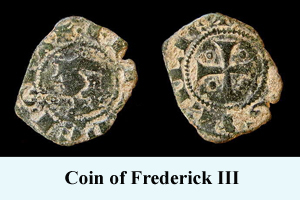Frederick was the youngest son of Peter III and born in 1272. On the death of Alfonso III in June 1291 his older brother James raced home to be crowned king and Frederick was left as viceroy of Sicily. Frederick was young, handsome and generally loved by the people. Moreover, he was an able administrator. By this time the Sicilians were coming to trust the Crown of Aragon less and less, feeling that they would eventually be sold out by the crown and Alfonso III's attempt at peace at the expense of the Sicilians at the Treaty of Tarascon did not help matters. It probably did not help also that later James would siphon off the fleet tax for his own use instead of using it on the one thing that was keeping island free of the Angevins. The final straw was the Treaty of Anagni, signed on June 15, 1295, which gave Sicily back to the Angevins . The outraged Sicilians turned to Frederick, who had already expressed a desire to become more than just viceroy of Sicily. Despite attempts by Boniface VIII to bribe him away from the throne, the Sicilians would elect him December 12, 1295 at Palermo as the new king of Sicily, Frederick III.
 Frederick's refusal to give up the throne resulted in renewed fighting. Frederick landed in
Calabria, where he seized several towns, encouraged
revolt in Naples,
negotiated with the Ghibellines of Tuscany and Lombardy, and
assisted the house of Colonna against Pope Boniface. Under the treaty James II
was obligated to help oust his brother from Sicily, but it is clear he gave only the
minimal amount of support required. At the
Battle
of Cape Orlando it seems clear he deliberately let Frederick
escape. It also seems evident that Roger of Lauria was under orders
from James II to only engage the Sicilians when absolutely required.
However, Frederick's defeat at this battle and the
Battle of Ponza
resulted in the destruction of the Sicilian fleet and meant that the
Sicilians could no longer prosecute the war against the Angevins. The
stalemate would eventually lead to the
Treaty
of Caltabellota.
Frederick's refusal to give up the throne resulted in renewed fighting. Frederick landed in
Calabria, where he seized several towns, encouraged
revolt in Naples,
negotiated with the Ghibellines of Tuscany and Lombardy, and
assisted the house of Colonna against Pope Boniface. Under the treaty James II
was obligated to help oust his brother from Sicily, but it is clear he gave only the
minimal amount of support required. At the
Battle
of Cape Orlando it seems clear he deliberately let Frederick
escape. It also seems evident that Roger of Lauria was under orders
from James II to only engage the Sicilians when absolutely required.
However, Frederick's defeat at this battle and the
Battle of Ponza
resulted in the destruction of the Sicilian fleet and meant that the
Sicilians could no longer prosecute the war against the Angevins. The
stalemate would eventually lead to the
Treaty
of Caltabellota.
When the pope finally ratified the treaty in 1303, the island experienced ten years of relative peace during which time Frederick reformed the administration and extended the powers of the Sicilian parliament, which was composed of the barons, the prelates and the representatives of the towns. However, he could not leave well-enough alone and in 1313 allied with Emperor Henry VII, breaking the treaty and leading to four years of war during which the Angevins conducted several devastating raids against the island. A truce was signed in 1317, but in 1321 the Sicilians helped the north Italian Ghibellines in the attack on Genoa, and Frederick seized some Church revenues for military purposes. Pope John XXII excommunicated him and placed the island under an interdict, which lasted until 1335, and the island again had to fend off renewed Angevin assaults. Frederick III would die at Paternione in 1337, and in spite of the peace of Caltabellotta his son Peter succeeded him.

